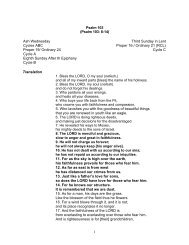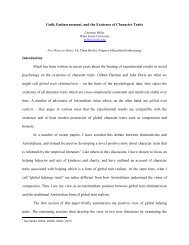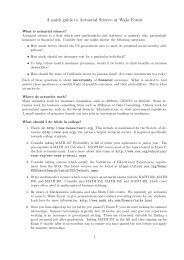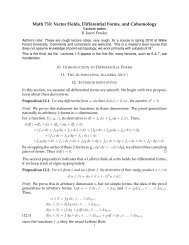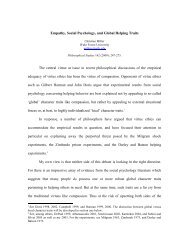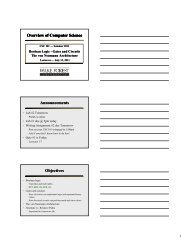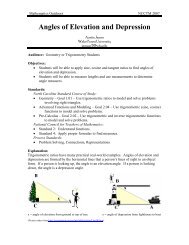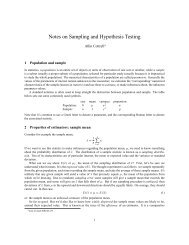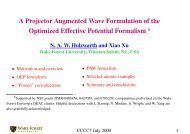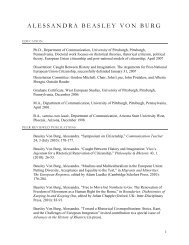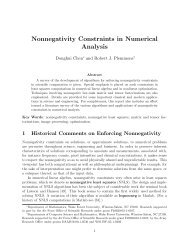Keynes, Ricardo, Malthus and Say's Law - Wake Forest University
Keynes, Ricardo, Malthus and Say's Law - Wake Forest University
Keynes, Ricardo, Malthus and Say's Law - Wake Forest University
You also want an ePaper? Increase the reach of your titles
YUMPU automatically turns print PDFs into web optimized ePapers that Google loves.
create a problem here—<strong>and</strong> there is no money in <strong>Malthus</strong>’sargument.⁶Some additional insight into the debate between <strong>Malthus</strong><strong>and</strong> <strong>Ricardo</strong> can be gained by considering <strong>Malthus</strong>’s case forthe necessity of ‘‘unproductive consumers’’ as a ballast forthe thrift of the capitalists (ch. vii, sec. ix of his Principles).<strong>Ricardo</strong> is incredulous ; from his point of view unproductiveconsumers are ‘‘just as necessary <strong>and</strong> as useful with a viewto future production, as a fire, which should consume in themanufacturers warehouse the goods which those unproductivelabourers would otherwise consume’’ (<strong>Ricardo</strong>, 1951a,p. 421). Insofar as <strong>Malthus</strong>’s proposal involves an increasein government expenditure—the paradigmatic ‘‘unproductivelabourer’’ is apparently a state functionary—it may betempting to assimilate it to modern <strong>Keynes</strong>ian ideas concerningfiscal policy. But this would be a mistake. Weshould note that <strong>Malthus</strong> recommends an increase in taxationto finance the payments to the unproductive consumers(<strong>Ricardo</strong>, 1951a, p. 433).The main point of interest in this section is the impliedcontrast between (a) the capitalist’s laying out his surplusin the form of payment of wages to additional labourers—acourse which, as we have seen, <strong>Malthus</strong> claimed was ‘‘no sortof use’’ in the pursuit of augmented wealth for the capitalistor his posterity—<strong>and</strong> (b) the appropriation of this surplusin the form of taxation, with the proceeds being passed, toput in bluntly, to a class of respectable parasites. Point (a)comes up again in this section when <strong>Malthus</strong> says ‘‘nobodywill ever employ capital merely for the sake of the dem<strong>and</strong>occasioned by those who work for him’’ (<strong>Ricardo</strong>, 1951a, p.429). But somehow it is all right if the dem<strong>and</strong> comes from⁶ That is, I agree with Sowell (1972, p. 96) when he says that, pace<strong>Keynes</strong>, <strong>Malthus</strong>’s analysis was in essence ‘‘as nonmonetary as that of thesupporters of Say’s <strong>Law</strong>.’’ The nearest <strong>Malthus</strong> comes to bringing moneyinto the Principles is an extended footnote (<strong>Ricardo</strong>, 1951a, pp. 316–7)urging its importance ; but this insight is not integrated into his analysisin any way.those who produce nothing. The only rationale for preferringconsumption on the part of unproductive labourers, it wouldseem, is precisely that the latter are unproductive—i.e. theydo not contribute to the production of a problematic surplusof commodities. This bespeaks a curious sort of ‘‘physicaloverproduction’’ theory on <strong>Malthus</strong>’s part, which is not tobe found in <strong>Keynes</strong>.⁷<strong>Ricardo</strong>’s question seems well put : ‘‘In what way cana man’s consuming my produce, without making me anyreturn whatever, enable me to make a fortune ? I shouldthink my fortune would be more likely to be made, if theconsumer of my produce returned me an equivalent value’’(<strong>Ricardo</strong>, 1951a, p. 422).⁸Also in this section <strong>Ricardo</strong> diagnoses what he sees asa key inconsistency in <strong>Malthus</strong>’s reasoning. <strong>Malthus</strong> saysthat, absent the unproductive consumers, too rapid an accumulationmay lead to a situation where ‘‘both capital <strong>and</strong>population may be at the same time, <strong>and</strong> for a period of greatlength, redundant, compared with the effective dem<strong>and</strong> forproduce’’ (<strong>Ricardo</strong>, 1951a, p. 427). <strong>Ricardo</strong> replies : ‘‘It isa contradiction in terms, it is saying that there is a capitalunemployed because its owner cannot find labourers, <strong>and</strong>there are people unemployed because there is no one havinga capital to employ them’’ (ibid.). So long as money is held⁷ Somewhat notoriously perhaps, <strong>Keynes</strong> held that even totally unproductiveactivities (e.g. burying pound notes <strong>and</strong> then digging them upagain) would be useful for stimulating a depressed economy, if they werefinanced by deficit spending. He did not, however, make any virtue of theunproductive nature of this activity, remarking that it ‘‘would, indeed, bemore sensible to build houses <strong>and</strong> the like’’ (<strong>Keynes</strong>, 1936, p. 129).⁸ As Kalecki (1954) showed, the aggregate (money) profits flowingto the capitalists are composed of capitalist expenditure (consumption<strong>and</strong> investment) plus the government’s budget deficit, plus the exportsurplus in an open economy, minus any saving made by the workers outof their wages. From this (admittedly anachronistic) perspective there isno stimulus to profit from a tax-financed increase in government transferpayments ; the effect on profit is negative if the taxation displaces capitalistexpenditure. I mention this point only to reinforce <strong>Ricardo</strong>’s skepticismfrom a different point of view.13 14




